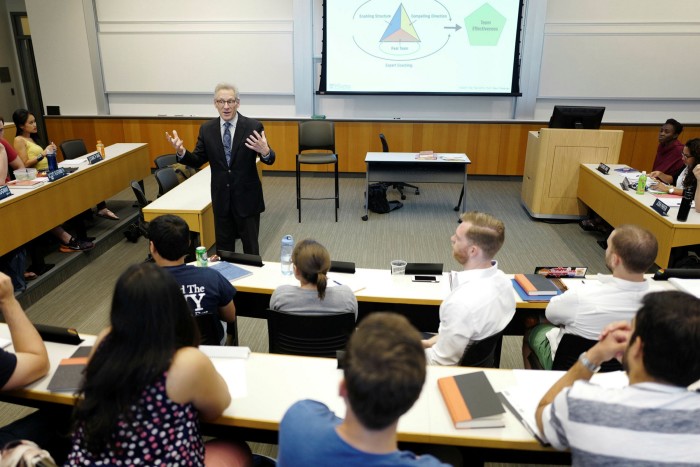MBAs and rankings must reflect new priorities

Roula Khalaf, Editor of the FT, selects her favourite stories in this weekly newsletter.
As Covid-19 shifts into a different — hopefully less dangerous — phase after two painful years, business is adjusting to the new era. While the pandemic has not transformed everything, it has certainly accelerated change for MBAs.
In the workplace, technology has helped ease a move to remote working while forcing staff to adapt to management at a distance. It has also intensified fraud, information overload and manipulation, including, as we report, the danger of deepfakes.
Within business schools, online and blended learning have helped provide continuity and improve accessibility, despite restrictions on travel and in-person classes. In the process, they have also slightly reduced the carbon footprint associated with education.
But the shift to digital has raised concerns about how to provide high-quality internships when these are conducted remotely; how to offer exposure to different countries and corporate cultures; and how to foster the friendships and teamwork that nurture powerful future alumni networks.
Global MBA Ranking 2022

Find out which schools are in our ranking of MBA degrees. Learn how the table was compiled and read the rest of our coverage at www.ft.com/mba.
Technology has also intensified competition from rival education providers, both business schools and start-ups, while adding to pressure for reductions in fees: Quantic School of Business and Technology is among a growing number of edtech companies offering online MBAs and Thunderbird School of Global Management recently launched free courses online.
Such disruptions have forced some institutions to lower their admission requirements and to increase the number of places offered, as they seek to maintain their intakes and retain top professorial talent.
The good news for students and schools, respectively, is that surveys in recent months have identified renewed appetite by recruiters for those with MBAs, and a corresponding jump in admissions — albeit with variations in different parts of the world.
The FT’s own analysis among leading schools ranked both two years ago and today suggests average class sizes have grown slightly while alumni starting salaries have also risen. So has value for money, calculated by salary increases net of fees and the opportunity costs of income sacrificed during study.
Alumni say that, alongside remuneration and promotion, they seek improved career opportunities and personal development. They are keen to gain insights into management, strategy, organisational behaviour, finance, international business and entrepreneurship.
Our guest professor touches on the last of these, as well as the increasing focus on diversity, in his column on the growth of funding for businesses owned by black people in the US suburbs.
The FT Global MBA rankings seek to reflect these varied priorities, and we are delighted that some business schools that temporarily pulled out as they focused on adjusting to the pandemic are again participating. That allows prospective students, recruiters and faculty to have a broader range of providers to benchmark, including on outcome measures such as salaries.
But money is not everything. Another, ever more frequent, demand is for education to focus on values, purpose and new approaches beyond profit maximisation, including the growing priority of sustainability against the backdrop of climate change. We review two books that make the case for a broader social role for business schools.
Reflecting these priorities, the FT intends to reduce the weighting given to salaries in its future rankings; we welcome suggestions on alternative factors to take into account. But quantification can only go so far. This report, and our wider coverage of business education, includes qualitative assessments, such as our responsible business education awards and analysis available at ft.com/rbe.
We also invite prospective students to join our first free webinar and workshops on MBAs on February 23 at ft.com/bized-live and ask questions to faculty, recruiters and alumni alike.
As we stress in an article on how to make successful applications, it is wise to seek out independent views on business schools and not just absorb the official message or be charmed by the prestigious brand name when identifying whether and where to study.
Despite all the recent transformations, one aspect of business education on which we report remains core to the MBA, even if its form has varied over time. The case method was pioneered at Harvard Business School a century ago and remains central to teaching in thousands of institutions around the world.
Engaging students in debate around practical management challenges is fundamental, and we offer a fascinating comparison of new and old. What has changed — as we illustrate with the original General Shoe Company case of 1921 and an abstract of one of the most recent cases, EbonyLife — is the length, format and focus.
Andrew Jack is the FT’s global learning editor
Comments